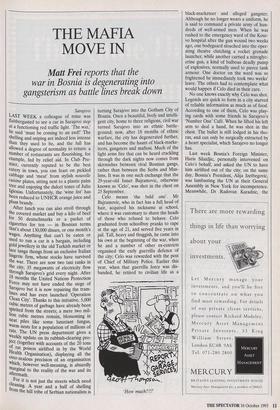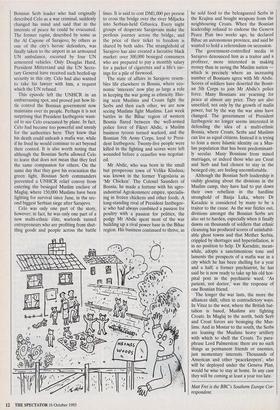THE MAFIA MOVE IN
Matt Frei reports that the
war in Bosnia is degenerating into gangsterism as battle lines break down
Sarajevo
LAST WEEK a colleague of mine was flabbergasted to see a car in Sarajevo stop at a functioning red traffic light. The war,' he said 'must be coming to an end!' The shelling and sniping are indeed less intense than they used to be, and the lull has allowed a degree of normality to return: a number of restaurants are flourishing, for example, fed by relief aid. In Club Pre- mier, currently reputed to be the best eatery in town, you can feast on pickled cabbage and 'meat' from stylish nouvelle cuisine plates, sitting next to a plastic palm tree and enjoying the dulcet tones of Julio Iglesias. Unfortunately, the 'wine list' has been reduced to UNHCR orange juice and plum brandy. After lunch you can also stroll through the covered market and buy a kilo of beef for 50 deutschmarks or a packet of cigarettes for ten — in Bosnian terms that's about 130,000 dinars, or one month's wages. Anything that can't be eaten or used to run a car is a bargain, including gold jewellery in the old Turkish market or lace tanga thongs from an exclusive Italian lingerie firm, whose stocks have survived the war. There are now two taxi ranks in the city; 35 megawatts of electricity flow through Sarajevo's grid every night. After 18 months the United Nations Protection Force may not have ended the siege of Sarajevo but it is now repairing the tram- lines and has even launched 'Operation Clean City'. Thanks to this initiative, 5,000 cubic metres of garbage have already been spirited from the streets; a mere two mil- hon cubic metres remain, blossoming in neat piles like some luxuriant fungus, warm nests for a population of millions of rats. The UN press department gives a weekly update on its rubbish-clearing pro- Jeet (together with accounts of the 20 tons of rat poison airlifted in by the World Health Organisation), displaying all the over-zealous precision of an organisation which, however well-meaning, is absurdly marginal to the reality of the war and its aftermath.
For it is not just the streets which need clean-tog. A year and a half of shelling from the hill tribe of Serbian nationalists is turning Sarajevo into the Gotham City of Bosnia. Once a beautiful, lively and intelli- gent city, home to three religions, civil war turned Sarajevo into an ethnic battle- ground; now, after 18 months of ethnic warfare, the city has degenerated further, and has become the haunt of black-marke- teers, gangsters and mafiosi. Much of the light arms fire that can be heard crackling through the dark nights now comes from skirmishes between, rival Bosnian gangs, rather than between the Serbs and Mus- lims. It was in one such exchange that the 29-year-old Ismet Bajramovic, otherwise known as 'Cele', was shot in the chest on 25 September. Celo means 'the bald one'. Mr Bajramovic, who in fact has a full head of hair, acquired his nickname at school, where it was customary to shave the heads of those who refused to behave. Celo graduated from schoolboy pranks to rape at the age of 21, and served five years in jail. Tall, heavy and thuggish, he came into his own at the beginning of the war, when he and a number of other ex-convicts organised the early guerrilla defence of the city; Celo was rewarded with the post of Chief of Military Police. Earlier this year, when that guerrilla force was dis- banded, he retired to civilian life as a 'How much?!!!' black-marketeer and alleged gangster. Although he no longer wears a uniform, he is said to command a private army of hun- dreds of well-armed men. When he was rushed to the emergency ward of the Kose- vo hospital after the gun wound two weeks ago, one bodyguard slouched into the oper- ating theatre clutching a rocket grenade launcher, while another carried a nitroglyc- erine gun, a kind of bulbous deadly pump of explosives, normally used to pierce tank armour. One doctor on the ward was so frightened he immediately took two weeks' leave. The others had to contemplate what would happen if Celo died in their care.
No one knows exactly why Celo was shot. Legends are quick to form in a city starved of reliable information as much as of food. According to one of them, Celo was play- ing cards with some friends in Sarajevo's `Number One' Café. When he lifted his left arm to deal a hand, he was shot in the chest. The bullet is still lodged in his tho- rax, and can only be surgically extracted by a heart specialist, which Sarajevo no longer has.
Last week Bosnia's Foreign Minister, Haris Silaidjic, personally intervened on Celo's behalf, and asked the UN to have him airlifted out of the city; on the same day, Bosnia's President, Alija Izetbegovic, was lambasting the UN at their General Assembly in New York for incompetence. Meanwhile, Dr Radovan Karadzic, the Bosnian Serb leader who had originally described Celo as a war criminal, suddenly changed his mind and said that in the interests of peace he could be evacuated. The former rapist, described by some as the Al Capone of Sarajevo, by others as one of the city's heroic defenders, was finally taken to the airport in an armoured UN ambulance, escorted by four UN armoured vehicles. Only Douglas Hurd, President Mitterrand and the UN Secre- tary General have received such beefed-up security in this city. Celo had also wanted to take his lawyer with him, a request which the UN refused.
This episode left the UNHCR in an embarrassing spot, and proved just how lit- tle control the Bosnian government now maintains over its people. Perhaps it is not surprising that President Izetbegovic want- ed to see Celo evacuated by plane. In fact, Celo had become too powerful and unruly for the authorities here. They knew that his death could unleash a mafia war, while if he lived he would continue to act beyond their control. it is also worth noting that although the Bosnian Serbs allowed Celo to leave that does not mean that they feel the same compassion for others. On the same day that they gave his evacuation the green light, Bosnian Serb commanders prevented a UNHCR relief convoy from entering the besieged Muslim enclave of Maglaj, where 150,000 Muslims have been fighting for survival since June, in the sec- ond biggest Serbian siege after Sarajevo.
Celo was only one part of the story, however; in fact, he was only one part of a new multi-ethnic elite, warlords turned entrepreneurs who are profiting from shut- tling goods and people across the battle lines. It is said to cost DM1,000 per person to cross the bridge over the river Miljacka into Serbian-held Grbavica. Every night groups of desperate Sarajevans make the perilous journey across the bridge, and the price of their ticket to freedom is shared by both sides. The stranglehold of Sarajevo has also created a lucrative black market: over 300,000 besieged consumers who are prepared to pay a monthly salary for a packet of cigarettes and a life's sav- ings for a pile of firewood.
The state of affairs in Sarajevo resem- bles life elsewhere in Bosnia, where eco- nomic 'interests' now play as large a role in keeping the war going as ethnicity. Hav- ing seen Muslims and Croats fight the Serbs and then each other, we are now seeing Muslims fight Muslims. Last week battles in the Bihac region of western Bosnia flared between the well-armed police force of Fikret Abdic, a Muslim business tycoon turned warlord, and the Bosnian 5th Army Corps, loyal to Presi- dent Izetbegovic. Twenty-five people were killed in the fighting and scores were left wounded before a ceasefire was negotiat- ed.
Mr Abdic, who was born in the small but prosperous town of Velika Kladusa; was known in the former Yugoslavia as `Mr Chicken'. The Colonel Saunders of Bosnia, he made a fortune with his agro- industrial Agrokommerc empire, specialis- ing in frozen chickens and other foods. A long-standing rival of President Izetbegov- ic who had always combined a passion for poultry with a passion for politics, the podgy Mr Abdic spent most of the war building up a rival power base in the Bihac region. His business continued to thrive, as
he sold food to the beleaguered Serbs in the Krajina and bought weapons from the neighbouring Croats. When the Bosnian leadership refused to endorse the Geneva Peace Plan two weeks ago, he declared Bihac an autonomous province, and said he wanted to hold a referendum on secession.
The government-controlled media in Sarajevo denounced him as a traitor and a profiteer, more interested in making money than in saving the Muslim nation which is precisely where an increasing number of Bosnians agree with Mr Abdic. Scores of soldiers have deserted the Bosni- an 5th Corps to join Mr Abdic's police force. Many Bosnians are yearning for peace at almost any price. They are also unsettled, not only by the growth of mafia power, but by the way the war aims have changed. The government of President Izetbegovic no longer seems interested in defending the idea of a multi-ethnic Bosnia, where Croats, Serbs and Muslims can live as equal citizens, Instead it is trying to foist a more Islamic identity on a Mus- lim population that has been predominant- ly secular. Many Bosnians from mixed marriages, or indeed those who are Croat and Serb and had chosen to stay in the besieged city, are feeling uncomfortable.
Although the Bosnian Serb leadership is visibly gloating about the divisions in the Muslim camp, they have had to put down their own rebellion in the hardline stronghold of Banja Luka, where Dr Karadzic is considered by many to be a traitor to the cause. As the war fizzles out, divisions amongst the Bosnian Serbs are also set to harden, especially when it finally dawns on thousands of soldiers that ethnic cleansing has produced scores of uninhabit- able ghost towns and that Mother Serbia, crippled by shortages and hyperinflation, is in no position to help. Dr Karadzic, mean- while, adopts a sanctimonious tone and laments the prospects of a mafia war in a city which he has been shelling for a year and a half; a former psychiatrist, he has said he is now ready to take up his old hos- pital post in the psychiatric ward. 'As patient, not doctor,' was the response of one Bosnian friend.
The longer the war lasts, the more the alliances shift, often in contradictory ways. In Vitez to the west, where the British bat- talion is based, Muslims are fighting Croats. In Maglaj to the north, both Serb and Croat forces are besieging the Mus- lims. And in Mostar to the south, the Serbs are loaning the Muslims heavy artillery with which to shell the Croats. To para- phrase Lord Palmerston: there are no such things as permanent friends or enemies, just momentary interests. Thousands of American and other 'peacekeepers', who will be deployed under the Geneva Plan, would be wise to stay at home. In any case they will be coming at least a year too late.



























































 Previous page
Previous page